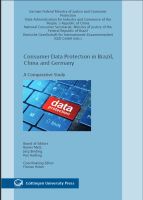Consumer data protection in Brazil, China and Germany
A comparative study
A comparative study
| dc.contributor.editor | Metz, Rainer | |
| dc.contributor.editor | Binding, Jörg | |
| dc.contributor.editor | Haifeng, Pan | |
| dc.contributor.editor | Huber, Florian | |
| dc.date.accessioned | 2016-12-31 23:55:55 | |
| dc.date.accessioned | 2019-11-28 13:31:29 | |
| dc.date.accessioned | 2020-04-01T14:10:27Z | |
| dc.date.available | 2020-04-01T14:10:27Z | |
| dc.date.issued | 2016 | |
| dc.identifier | 610409 | |
| dc.identifier | OCN: 1030817658 | en_US |
| dc.identifier.uri | http://library.oapen.org/handle/20.500.12657/32441 | |
| dc.description.abstract | The rapid development of new information and communication technologies has changed people’s everyday life and consumption patterns significantly. The worldwide spread of those technologies provides many innovations for consumers, but it can also bear risks, such as the indiscriminate collection, storage and cross-border flow of personal data, illegal spying on Internet activities, dissemination of personal information, and abuse of user passwords. The study deals with the current state of consumer data protection law in Brazil, China and Germany from a comparative perspective. It covers the main legal issues of consumer privacy and data protection in these countries and seeks to explain current issues and case law concerning consumer data protection from a practical perspective. | |
| dc.language | English | |
| dc.subject.classification | thema EDItEUR::L Law | en_US |
| dc.subject.other | consumer data protection | |
| dc.subject.other | enforcement | |
| dc.subject.other | regulations | |
| dc.subject.other | China | |
| dc.subject.other | Cloud computing | |
| dc.subject.other | General Data Protection Regulation | |
| dc.subject.other | Information privacy | |
| dc.subject.other | Internet | |
| dc.subject.other | Personal data | |
| dc.title | Consumer data protection in Brazil, China and Germany | |
| dc.title.alternative | A comparative study | |
| dc.title.alternative | A comparative study | |
| dc.type | book | |
| oapen.abstract.otherlanguage | Die rasante Entwicklung neuer Informations- und Kommunikationstechnologien hat das Alltagsleben und die Konsummuster der Menschen stark verändert. Die weltweite Verbreitung dieser Technologien bietet viele Innovationen für die Verbraucher, kann aber auch Risiken bergen, wie z. B. das wahllose Sammeln, Speichern und grenzüberschreitende Abfließen persönlicher Daten, das illegale Ausspionieren von Internetaktivitäten, die Weitergabe persönlicher Informationen und den Missbrauch von Benutzerpasswörtern. Die Studie befasst sich mit dem aktuellen Stand des Verbraucherdatenschutzrechts in Brasilien, China und Deutschland aus einer vergleichenden Perspektive. Sie deckt die wichtigsten rechtlichen Fragen des Verbraucherdatenschutzes in diesen Ländern ab und versucht, aktuelle Fragen und Rechtsprechung zum Verbraucherdatenschutz aus einer praktischen Perspektive zu erläutern. (übersetzt mit der kostenlosen Version von DeepL) | de |
| oapen.identifier.doi | 10.17875/gup2016-960 | |
| oapen.relation.isPublishedBy | ffaff15c-73ed-45cd-8be1-56a881b51f62 | |
| oapen.relation.isbn | 9783863952365 | |
| oapen.collection | AG Universitätsverlage | |
| oapen.remark.public | Relevant Wikipedia pages: China - https://en.wikipedia.org/wiki/China; Cloud computing - https://en.wikipedia.org/wiki/Cloud_computing; Consumer protection - https://en.wikipedia.org/wiki/Consumer_protection; Data processing - https://en.wikipedia.org/wiki/Data_processing; Data Protection Directive - https://en.wikipedia.org/wiki/Data_Protection_Directive; General Data Protection Regulation - https://en.wikipedia.org/wiki/General_Data_Protection_Regulation; Information privacy - https://en.wikipedia.org/wiki/Information_privacy; Internet - https://en.wikipedia.org/wiki/Internet; Personal data - https://en.wikipedia.org/wiki/Personal_data | |
| oapen.identifier.ocn | 1030817658 |

